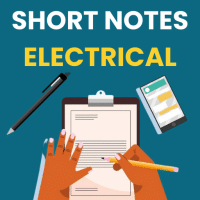Electrical Engineering (EE) Exam > Electrical Engineering (EE) Questions > If two bulbs are connected in parallel and on...
Start Learning for Free
If two bulbs are connected in parallel and one bulb blows out, what happens to the other bulb?
- a)The other bulb blows out as well
- b)The other bulb continues to glow with the same brightness
- c)The other bulb glows with increased brightness
- d)The other bulb stops glowing
Correct answer is option 'B'. Can you explain this answer?
Most Upvoted Answer
If two bulbs are connected in parallel and one bulb blows out, what ha...
In a parallel circuit, if one bulb blows out, it acts as an open circuit. Current does not flow in that branch but it continues to flow in the other branch hence the bulb continues to glow.
Free Test
FREE
| Start Free Test |
Community Answer
If two bulbs are connected in parallel and one bulb blows out, what ha...
In parallel connection the voltage same across the bulbs . if one bulb open eventhough the voltage will same ,
brightness of the bulb depends the voltage,because one of the bulb open circuit other bulb glows will be same brightness.
brightness of the bulb depends the voltage,because one of the bulb open circuit other bulb glows will be same brightness.

|
Explore Courses for Electrical Engineering (EE) exam
|

|
Question Description
If two bulbs are connected in parallel and one bulb blows out, what happens to the other bulb?a)The other bulb blows out as wellb)The other bulb continues to glow with the same brightnessc)The other bulb glows with increased brightnessd)The other bulb stops glowingCorrect answer is option 'B'. Can you explain this answer? for Electrical Engineering (EE) 2025 is part of Electrical Engineering (EE) preparation. The Question and answers have been prepared according to the Electrical Engineering (EE) exam syllabus. Information about If two bulbs are connected in parallel and one bulb blows out, what happens to the other bulb?a)The other bulb blows out as wellb)The other bulb continues to glow with the same brightnessc)The other bulb glows with increased brightnessd)The other bulb stops glowingCorrect answer is option 'B'. Can you explain this answer? covers all topics & solutions for Electrical Engineering (EE) 2025 Exam. Find important definitions, questions, meanings, examples, exercises and tests below for If two bulbs are connected in parallel and one bulb blows out, what happens to the other bulb?a)The other bulb blows out as wellb)The other bulb continues to glow with the same brightnessc)The other bulb glows with increased brightnessd)The other bulb stops glowingCorrect answer is option 'B'. Can you explain this answer?.
If two bulbs are connected in parallel and one bulb blows out, what happens to the other bulb?a)The other bulb blows out as wellb)The other bulb continues to glow with the same brightnessc)The other bulb glows with increased brightnessd)The other bulb stops glowingCorrect answer is option 'B'. Can you explain this answer? for Electrical Engineering (EE) 2025 is part of Electrical Engineering (EE) preparation. The Question and answers have been prepared according to the Electrical Engineering (EE) exam syllabus. Information about If two bulbs are connected in parallel and one bulb blows out, what happens to the other bulb?a)The other bulb blows out as wellb)The other bulb continues to glow with the same brightnessc)The other bulb glows with increased brightnessd)The other bulb stops glowingCorrect answer is option 'B'. Can you explain this answer? covers all topics & solutions for Electrical Engineering (EE) 2025 Exam. Find important definitions, questions, meanings, examples, exercises and tests below for If two bulbs are connected in parallel and one bulb blows out, what happens to the other bulb?a)The other bulb blows out as wellb)The other bulb continues to glow with the same brightnessc)The other bulb glows with increased brightnessd)The other bulb stops glowingCorrect answer is option 'B'. Can you explain this answer?.
Solutions for If two bulbs are connected in parallel and one bulb blows out, what happens to the other bulb?a)The other bulb blows out as wellb)The other bulb continues to glow with the same brightnessc)The other bulb glows with increased brightnessd)The other bulb stops glowingCorrect answer is option 'B'. Can you explain this answer? in English & in Hindi are available as part of our courses for Electrical Engineering (EE).
Download more important topics, notes, lectures and mock test series for Electrical Engineering (EE) Exam by signing up for free.
Here you can find the meaning of If two bulbs are connected in parallel and one bulb blows out, what happens to the other bulb?a)The other bulb blows out as wellb)The other bulb continues to glow with the same brightnessc)The other bulb glows with increased brightnessd)The other bulb stops glowingCorrect answer is option 'B'. Can you explain this answer? defined & explained in the simplest way possible. Besides giving the explanation of
If two bulbs are connected in parallel and one bulb blows out, what happens to the other bulb?a)The other bulb blows out as wellb)The other bulb continues to glow with the same brightnessc)The other bulb glows with increased brightnessd)The other bulb stops glowingCorrect answer is option 'B'. Can you explain this answer?, a detailed solution for If two bulbs are connected in parallel and one bulb blows out, what happens to the other bulb?a)The other bulb blows out as wellb)The other bulb continues to glow with the same brightnessc)The other bulb glows with increased brightnessd)The other bulb stops glowingCorrect answer is option 'B'. Can you explain this answer? has been provided alongside types of If two bulbs are connected in parallel and one bulb blows out, what happens to the other bulb?a)The other bulb blows out as wellb)The other bulb continues to glow with the same brightnessc)The other bulb glows with increased brightnessd)The other bulb stops glowingCorrect answer is option 'B'. Can you explain this answer? theory, EduRev gives you an
ample number of questions to practice If two bulbs are connected in parallel and one bulb blows out, what happens to the other bulb?a)The other bulb blows out as wellb)The other bulb continues to glow with the same brightnessc)The other bulb glows with increased brightnessd)The other bulb stops glowingCorrect answer is option 'B'. Can you explain this answer? tests, examples and also practice Electrical Engineering (EE) tests.

|
Explore Courses for Electrical Engineering (EE) exam
|

|
Signup for Free!
Signup to see your scores go up within 7 days! Learn & Practice with 1000+ FREE Notes, Videos & Tests.


















